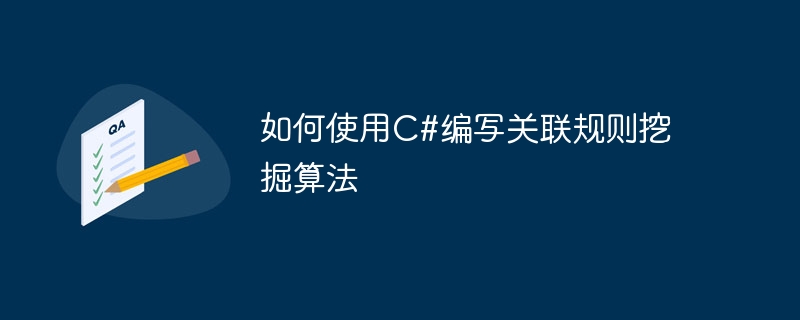如何使用C#編寫關聯規則挖掘演算法
- PHPz原創
- 2023-09-19 16:19:471086瀏覽

如何使用C#編寫關聯規則挖掘演算法
引言:
關聯規則挖掘是資料探勘中的重要任務之一,用於發現資料集中的隱藏模式和關聯關係。常見的應用包括市場籃子分析、推薦系統、網路使用者行為分析等。本文將介紹如何使用C#編寫關聯規則挖掘演算法,並給出具體的程式碼範例。
一、關聯規則探勘演算法簡介
關聯規則探勘演算法的目標是發現資料集中的頻繁項集和關聯規則。頻繁項集是指在資料集中頻繁出現的項目組合,而關聯規則則是由頻繁項集推導出的模式。演算法主要包括兩個步驟:1)產生候選項集;2)篩選頻繁項集和產生關聯規則。
二、C#程式碼實作關聯規則探勘演算法
- 資料準備
首先,我們需要準備一個包含交易資料的資料集。可以使用C#的List- 結構來表示,其中每個List表示一個事務,每個元素表示一個項目。
List<List<string>> dataset = new List<List<string>>();
dataset.Add(new List<string> { "A", "B", "C" });
dataset.Add(new List<string> { "A", "B", "D" });
dataset.Add(new List<string> { "B", "C", "D" });
// ...- 產生候選項集
接下來,我們需要根據資料集產生候選項集。候選項集是指可能成為頻繁項集的項集。可以使用C#的Dictionary結構來表示,其中鍵表示候選項集,值表示候選項集的支持度計數。
Dictionary<List<string>, int> candidateItemsets = new Dictionary<List<string>, int>();
// 生成候选项集
foreach (List<string> transaction in dataset)
{
foreach (string item in transaction)
{
List<string> candidate = new List<string> { item };
if (candidateItemsets.ContainsKey(candidate))
{
candidateItemsets[candidate]++;
}
else
{
candidateItemsets.Add(candidate, 1);
}
}
}- 篩選頻繁項集
在本步驟中,我們將篩選出頻繁項集。頻繁項集是指支持度不小於閾值的項集。可以使用C#的List- 結構來表示,其中每個List表示一個頻繁項集。
List<List<string>> frequentItemsets = new List<List<string>>();
int supportThreshold = 2; // 设置支持度阈值
// 筛选频繁项集
foreach (var itemset in candidateItemsets)
{
if (itemset.Value >= supportThreshold)
{
frequentItemsets.Add(itemset.Key);
}
}- 產生關聯規則
最後,我們將根據頻繁項集產生關聯規則。關聯規則是指具有一定置信度的頻繁項集之間的規則。可以使用C#的List Tuple結構來表示,其中每個Tuple表示一條關聯規則。
List<Tuple<List<string>, List<string>>> associationRules = new List<Tuple<List<string>, List<string>>>();
double confidenceThreshold = 0.5; // 设置置信度阈值
// 生成关联规则
foreach (var frequentItemset in frequentItemsets)
{
int itemsetLength = frequentItemset.Count;
for (int i = 1; i < itemsetLength; i++)
{
List<List<string>> combinations = GetCombinations(frequentItemset, i);
foreach (var combination in combinations)
{
List<string> remainingItems = frequentItemset.Except(combination).ToList();
double confidence = (double)candidateItemsets[frequentItemset] / candidateItemsets[combination];
if (confidence >= confidenceThreshold)
{
associationRules.Add(new Tuple<List<string>, List<string>>(combination, remainingItems));
}
}
}
}- 輔助函數
在上述程式碼中我們使用到了一個輔助函數GetCombinations,用於產生項集的組合。下面給出具體程式碼實作。
public List<List<string>> GetCombinations(List<string> items, int length)
{
List<List<string>> combinations = new List<List<string>>();
Combine(items, length, 0, new List<string>(), combinations);
return combinations;
}
private void Combine(List<string> items, int length, int start, List<string> currentCombination, List<List<string>> combinations)
{
if (length == 0)
{
combinations.Add(new List<string>(currentCombination));
return;
}
if (start == items.Count)
{
return;
}
currentCombination.Add(items[start]);
Combine(items, length - 1, start + 1, currentCombination, combinations);
currentCombination.RemoveAt(currentCombination.Count - 1);
Combine(items, length, start + 1, currentCombination, combinations);
}三、總結
本文介紹如何使用C#編寫關聯規則挖掘演算法,並給出了具體的程式碼範例。透過產生候選項集、篩選頻繁項集和產生關聯規則這三個步驟,我們可以從一個事務資料集中發現隱藏的模式和關聯關係。希望本文對於理解關聯規則挖掘演算法以及C#程式設計有所幫助。
以上是如何使用C#編寫關聯規則挖掘演算法的詳細內容。更多資訊請關注PHP中文網其他相關文章!
陳述:
本文內容由網友自願投稿,版權歸原作者所有。本站不承擔相應的法律責任。如發現涉嫌抄襲或侵權的內容,請聯絡admin@php.cn
上一篇:如何使用C#編寫目標辨識演算法下一篇:如何使用C#編寫目標辨識演算法

